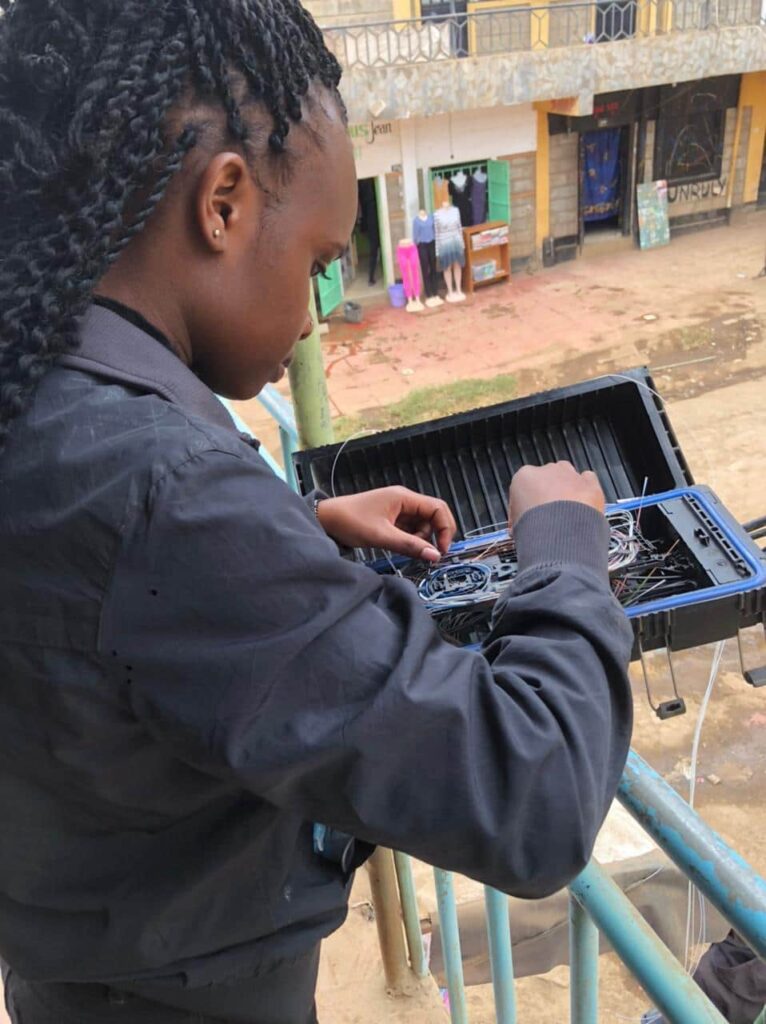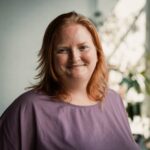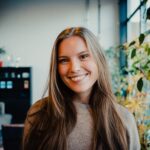48percent.org:
Promoting Digital Inclusion through
Equitable Access to Connectivity
Netherlands-based foundation 48percent.org works to empower communities across the globe via Internet access, computer equipment, digital skills, and awareness of data privacy and safe Internet use. Placing special focus on training so projects become self-sustaining over time, 48percent.org dreams of a world where digital exclusion is obsolete and Internet access is a public utility just like water and electricity.
In 2023, to reach more partners, develop courses, and build its network, 48percent.org became an Internet Society member.
A Conversation with Ashley and Theresa
Over a transcontinental video call with the Internet Society, two 48percent.org staff members speak about the foundation’s beginnings, values, and vision for the future of the Internet. They also review what 48percent.org has achieved and the impact its Internet Society membership has had so far.
An Idea Sparked by Telecommunications
The foundation’s story begins with entrepreneur Mark Vletter in the Netherlands, who founded the telecommunications firm Voys. He soon realized that in addition to facilitating communication in his own country, this purpose-driven organization could fund a non-profit devoted to bringing connectivity to people in other parts of the world.
In 2019, he put this plan into action by creating 48percent.org. Ashley explains the choice of name. “It comes from the fact that in 2019, when we were founded, 48 percent of the world’s population still didn’t have affordable access to the Internet. That’s something we watch yearly to see how the number changes and what’s being done.” By 2023, that figure had already fallen to 33 percent, which not only comes down to 48percent and other changemakers’ efforts but also because of a higher global awareness of the necessity for connectivity.
It comes from the fact that in 2019, when we were founded, 48 percent of the world’s population still didn’t have affordable access to the Internet. That’s something we watch yearly to see how the number changes and what’s being done.”
Pollien van Keulen, a foundation coordinator and the most senior staff member, was instrumental in bringing 48percent.org to life. After the initial idea had been sparked, Voys hired Pollien to develop it and build the organization. “She shaped the way we allocate our funding and speak about the Internet and our goals and ambitions,” Theresa says.
“Voys is a purpose-driven organization,” Ashley says. “Its mission is to empower people and give them an equal voice, as its name suggests, wherever in the world they might be. That translates to everything—from the commercial part to the socially impactful initiatives like 48percent.org—being done with that purpose in mind.”
The foundation uses funds supplied by Voys to finance non-profit connectivity projects around the globe so more people can use the Internet for things such as accessing online education, consulting with a doctor remotely, or conducting business. Nearly five years on, 48percent.org now has many trusted partners running projects in places such as Colombia, Guatemala, Kenya, Malawi, Nepal, Nigeria, and Uganda, in addition to the Netherlands. The foundation is becoming known to an ever-wider international circle as its existing partners point other potential partners its way.
Theresa described one of 48percent.org’s ongoing endeavors. “Over the past year, we’ve been co-funding an Internet Society project in Nepal that’s bringing the Internet to two Sherpa villages. It’s been great to see how the Internet is changing things for them at a time when they need to diversify their incomes because of global warming and climate change. It’s amazing to be able to contribute to that.”
“Equitable” as a Pathway to “Equal”
48percent.org’s motto is “equitable access to connectivity.” Ashley explains what exactly this means: “We say ‘equitable access’ rather than ‘equal access’ because the same solution isn’t going to work for everyone. There are different infrastructures to be considered to reach that goal, and different needs. The end goal is equal access to communication, but equitable access is how we’re going to get there. There’s no one-size-fits-all solution.”
This approach means keeping a community’s specific needs in mind during a project’s design so the beneficiaries will have everything required for a more level playing field. For example, one population may need only a stronger Internet connection, while another may also lack the most rudimentary computer skills, having never been exposed to such devices before.
An Open and Trusted Global Internet
The concept of a safe, open Internet is at the heart of 48percent.org’s mission. Like the Internet Society, its staff strongly believe that everyone, regardless of income or place of residence, should have the same access to the Internet. “This is especially important at a time when a lot of the Internet is being controlled by heads of governments, who can then control the flow of information—or disinformation, as the case may be,” Theresa says.
We say ‘equitable access’ rather than ‘equal access’ because the same solution isn’t going to work for everyone. […] The end goal is equal access to communication, but equitable access is how we’re going to get there.
She points out that the open Internet is the very thing that enables 48percent.org to do its work. “For us to connect with non-governmental organizations that want to take action in their areas but need funding, it’s essential that neither their Internet nor ours be compromised in any way,” she says. “It’s also vital for research purposes, to better understand the implications of less or more Internet access in different regions.”
Turning a Privilege into a Right
Much of the world still lacks the basic Internet infrastructure, computers, and electronic devices that residents of more industrialized countries take for granted. Ashley recounts two situations that drove this stark contrast home to her. “In our early days, we made a how-to guide for our partners with guidelines and suggestions for photos they could take to illustrate their projects for our website. I started getting replies like, ‘We can get you one or two pictures, but we have to wait a month, because then the person who has a phone with a camera can take the shots, and we’ll send them through WeTransfer the next time we’re in a larger city.’ That gave me a better understanding of digital exclusion, as someone who’s used to taking photos every day to share with my family on another continent. I realized it was a big privilege that not everyone has.”
We believe that reliable Internet access should be a public utility just like water or electricity. All of our efforts are oriented to making that a reality someday.”
Another time, she was on a video call with a non-profit in India. “One of the partners was connected through audio only, because the signal wasn’t strong enough to have the video on, but there were a lot of strange background noises. At the end of the call, he said, ‘I just want to show you where I am, to give you an idea of the connectivity problems we face here.’ He turned on his video and he was actually sitting in the back of a tuk-tuk (motorized rickshaw) parked on the street. He explained that the signal in his office was too weak for him to even join the call.” Such situations are exactly what 48percent.org is working to change. “We believe that reliable Internet access should be a public utility just like water or electricity,” Ashley says. “All of our efforts are oriented to making that a reality someday. The social and economic implications of not having it are so great that it shouldn’t be limited to people who can afford it or who live somewhere with well-built infrastructures.”
Digital Literacy and Privacy Awareness
Setting up computer centers and Internet infrastructures in local communities is certainly one piece of the puzzle. But both Theresa and Ashley emphasize that these things aren’t enough. “It’s easy to think that sending laptops somewhere will solve a problem,” says Theresa. “But we have to remember that digital skills aren’t something you naturally acquire at a young age if you don’t grow up with digital equipment around you.”
Mentioning a recent initiative for young people in Nigeria that 48percent.org helped fund, she explains that for a project to truly make a difference, it must train beneficiaries in essential skills such as typing on a keyboard, setting up an email account, and sending an email, as well as showing them how to protect their personal data and stay safe on the Internet. “These things are such a given for us that we sometimes forget how many steps are actually necessary to acquire solid digital literacy. It’s so important for these skills to be more accessible to people around the world.”
Ashley agrees. “Certain things make the digital divide larger rather than smaller—for example, not knowing how to safely use the Internet. If you get on there and you share everything that you’re used to sharing personally, that’s quite dangerous. If you don’t know you need to protect your personal information, devastating things can happen to you.”
For this reason, everything 48percent.org does involves action in three key program lines: access to affordable connectivity, digital literacy, and awareness of privacy and safe Internet use.
48percent.org and the Internet Society

The foundation’s staff first learned about the Internet Society while searching for partners to work with, and soon saw that their values were closely aligned. “We contributed funding to the Internet Society’s empowerment program before becoming an organization member,” says Ashley.
One of the two organizations’ first collaborations was a Designing and Deploying Computer Networks (DDCN) training course in Kenya that empowered young people to facilitate network infrastructure and security for their local community. The participants learned how to install, configure, and maintain an Internet network and also received training in the basics of marketing and communications. When it ended, the participants went on to do internships at various local companies, setting up radio stations or WiFi hotspots and learning more about networks.
The Internet Society is a very trustworthy partner. We know we can always rest assured that everything will be well organized. We trust that the project will go smoothly and have impact on the target beneficiaries.”
48percent.org now also works with the Internet Society’s community chapters. One current project involves a community network in Ugunja, a market town in western Kenya. Theresa says.“ What’s great about this project is that it includes a training program to make it sustainable, which means it won’t need to be continually funded, and the local people won’t need to depend on us or the organization that starts it.”
Ashley concurs. “The Internet Society is a very trustworthy partner. We know we can always rest assured that everything will be well organized. We trust that the project will go smoothly and have impact on the target beneficiaries.”
Working Together for a Brighter Future
48percent.org recently deepened its collaboration with the Internet Society by offering “on demand” courses to its partners. “Given the nature of our mission, our work and communications are partner-focused. Everything we do is for our partners, because although we contribute funding, they’re the ones doing all the work,” says Theresa.
She explains how the course-creation initiative fits in with 48percent.org’s values. “Given the nature of our mission, our work and communications are partner-focused. Everything we do is for our partners. Being able to offer them something that will bring even more value to their efforts to expand and secure connectivity means so much to us.”
By working together, we can champion a stronger and better Internet and help ensure it’s available to all for the benefit of human progress.
Together with our global community, members of the Internet Society have the unique chance to grow, strengthen, and shape the Internet of the future. Join us.
Image credit:
© João Aguiar/Internet Society, © 48percent.org, © 48percent.org, © 48percent.org, © Nyani Quarmyne, © George Waithaka, © Internet Society

